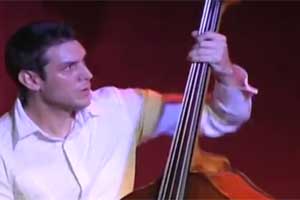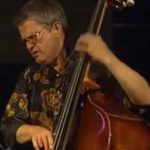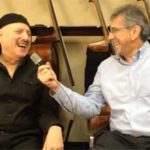FBPO goes one-on-one with this young bassist, who has accomplished so much: prolific output, strong leadership, Carnegie Hall and more.
Exclusive interview with FBPO’s Jon Liebman
June 13, 2011
Born in 1966 in New Haven, Connecticut, Ben Allison has performed throughout the world with his groups, The Ben Allison Band, Peace Pipe, Medicine Wheel, and Man Size Safe. He’s also toured and recorded with musicians ranging from oudist Ara Dinkjian to legendary saxophonist Lee Konitz to performance artist Joey Arias.
Ben has released ten CDs as a leader, the last six of which have reached #1 on the CMJ Jazz Radio charts. He has appeared on over forty albums by various artists and has written music for radio, television and film. At age 25, Ben formed the Jazz Composers Collective, a non-profit organization, based in New York and dedicated to the development and exploration of new music. A Downbeat Critic’s Poll winner in 2005, 2006 and 2007, Ben’s latest album, Action-Refraction, was released in April 2011.
FBPO: Tell me about your musical upbringing.
BA: I grew up in New Haven, Connecticut. The instrument that first caught my ear was the guitar. I have recordings that I made myself at a very early age, basically banging on a nylon string guitar. I have fond memories of those early years. I had no technique of any kind. It was all about the joy of making noise.
FBPO: How did you become a bass player?
BA: By high school, I was more serious about music, playing mostly hand drums and studying West African drumming traditions, working out tunes on the piano and playing guitar. I discovered the acoustic bass in my senior year at the Educational Center for the Arts, where I went to high school, and quickly immersed myself in a thorough study of its history and mechanics. To my mind, the acoustic bass is the lovechild of the guitar and the drum. It has the harmonic and melodic capabilities of the guitar, but also the percussive qualities of a drum – at least the way I like to play it! Charles Mingus, Dave Holland, Scott LaFaro, Charlie Haden, George Duvivier, Oscar Pettiford, Milt Hinton, Wilbur Ware and host of other bass players all had a huge impact on me. I was especially attracted to the bass players who were also bandleaders and composers. I think they have a unique perspective on how to build a band sound and on how musicians interact while playing. The bass has tremendous power to set the harmony and rhythmic direction of a piece of music.
FBPO: Did you begin learning the bass in the traditional way, with the bow, Simandl method, etc?
BA: I did a little bit of Simandl, with Homer Mensch of the New York Philharmonic and Juilliard, but quickly felt it wasn’t my thing. I’ve always been a student of rhythm and texture. I like folk music, which is functional and social. I consider a lot of jazz to be folk music, especially when it’s played with joy and a healthy amount of irreverence. Part of the fun of learning to play is finding your own technique and figuring out ways to translate what you’re feeling into sound. Over the years, I’ve developed my own voice as a bassist, my own approach to playing. It’s something that could have happened only through trial and error.
FBPO: When did you get bitten by the jazz bug?
BA: I didn’t hear a lot of jazz as a child. My parents had a few records, including Miles Davis’ Some Day My Prince Will Come and a Billie Holiday compilation, but for the most part, whatever jazz I heard I had to go find for myself. It was a personal journey, fueled by curiosity and the belief that there must be more out there. At first, most of this exploration happened at local record stores, where I could audition vinyl records before I bought them and trade in old records for different ones. Things really took off when I moved to New York City, the jazz epicenter of the world, where I got to hear so many great musicians play.
FBPO: How do you think growing up so close to New York City influenced you, musically?
BA: To borrow a phrase used in cosmology, living in New Haven was like living beyond the event horizon, past the point of no return. The gravitational pull of NYC was too strong to ignore. There are more great musicians in New York than anywhere else I’ve ever been – musicians of every conceivable musical background and genre. Over the years, I’ve had the chance to play with some amazing musicians, masters of instruments as diverse as the kora, cello, oud, synthesizer, alto flute, violin, bass clarinet, cumbus, sarangi, banjo, Theremin, ngoni, ballaphone, and slide trumpet, in addition to more typical instruments like saxophones, guitars, drums, etc. In NYC, we are surrounded by so many cultures, each with its own musical traditions. I can’t help but be influenced by it all. That’s why I live here.
FBPO: How did you get started as a solo artist, especially at such a young age?
BA: I don’t really think of myself as a “solo” artist. Good music is almost always a collaborative effort. Although I’ve always had an independent streak and a vision for what I might do if I ever had the chance to lead a band, I also enjoy playing other people’s music and trying to support their visions. My primary goal is to be involved with creative music, of any genre really, as long as it’s going for something personal and is not generic.
FBPO: You’ve received accolades, not only as a bass player, but as a composer and arranger, as well. How would you describe just who you are and what you do?
BA: Most of the music I’m involved with calls for a healthy amount of improvisation. I consider composition and improvisation to be two sides of the same coin. In a way, improvisation is spontaneous composing. Conversely, when I write tunes, I like to start with ideas that come organically, without a lot of thought, much in the same way that improvisational ideas form. Then I shape those ideas into something more concrete and purposeful. I don’t like a lot of waste in my tunes. I try to carry that mindset over into my improvisations, keeping them relatively simple and to the point. Orchestrating a tune is part of the compositional process and often has a profound impact on the character of a piece. I still like the word “vibe.” It sums up what I’m talking about. The vibe or mood of a tune informs the musician about how they might approach their improvisations. Part of my inspiration for writing tunes is to make myself sound good as a bassist. I like writing things that feature some of the special things I do. I also see them as springboards for the musicians I’m playing with and often consider who I’m writing for when I’m putting something together. I consider myself to be equal parts composer, orchestrator and bassist.
FBPO: Tell me about the Jazz Composers Collective.
BA: The Collective was a non-profit, musician-run composers’ organization I started with some musician colleagues when I was 25. It was born out of a sense of frustration. We were feeling a bit disconnected with what was happening on the scene in New York in the early 1990s. At that time there was a strong neo-conservative movement happening in jazz, a push by some to codify the music, to define it in what I believed to be overly narrow terms. The Collective was formed in reaction to this. Our concern was that jazz might be relegated to the dustbin of history, at least in the eyes of the public. We didn’t want jazz to be “America’s classical music.” Jazz is not a repertory art form. It’s a living, breathing, vibrant art form that continues to evolve and expand. From 1992 until its dissolution in 2004, the Collective presented an annual concert series, published a newsletter, organized an annual festival, promoted a wide range of educational activities, performed a residency at MoMA in NYC, advocated for artist empowerment and helped build audiences for jazz. By the end of its run, the Collective had presented over a hundred concerts, featuring the premieres of over three hundred works by nearly fifty composers and the participation of over two hundred fifty musicians. It was a gratifying experience that spawned a lot of very creative music. I acted as the organization’s Artistic Director, as well as one of five Composers-in-Residence.
FBPO: You must be excited about your newest release, Action-Refraction. How is it different from your previous CDs?
BA: Action-Refraction is my tenth album and features my current touring band of Steve Cardenas, guitar; Michael Blake, saxophones and bass clarinet; Jason Lindner, analog synthesizer and piano; Brandon Seabrook, guitar; and Rudy Royston, drums. This project is a bit of a departure for me in that it consists mostly of covers. We do tunes by Donny Hathaway, PJ Harvey, Samuel Barber, Thelonious Monk, the Carpenters, Neil Young, and one by me. My goal was to refract these wildly differing tunes through our own lens, then reassemble them in new ways and somehow tie them together into a cohesive whole.
FBPO: What’s next in your career? I see you’ve got a date at Carnegie Hall next year.
BA: I’m very excited about the Carnegie Hall show. I guess any musician would be, right? It’s kind of a milestone. Also, we’re headlining at the Saratoga Jazz Festival this summer, which takes place at a beautiful outdoor venue in the rolling hills of Saratoga Springs, New York. This year, there’s a killer lineup of bands that I’m proud to share the stage with. Speaking of which, I’m excited about my new website. For the first time, folks can download all of my albums in a variety of formats. In addition to the usual ones, like mp3 and AAC, there are also high-resolution formats for the audiophiles, like FLAC and source audio. Musicians can get charts for many of my tunes, too. I even have a signup widget where people can enter an e-mail address and get a free download from the new album. I think the idea of musicians connecting directly with their audience will only grow as we go forward. Who knows? In ten years, there might not be any record labels left. Technology is changing the music business in ways that are hard to fully grasp. What will never change is that people love listening to music and musicians love creating it. I’m proud to be a part of the worldwide community of bassists.
FBPO: What would you be if you weren’t a bass player?
It’s hard to imagine not being who you are, but if I had chosen another career path, I think it might have had something to do with science. I developed my interest in science in my 20s. The problem, as I see it now, is that my interests are too broad. It would have been hard to pick a focus. Academia is not my cup of tea, so I might have gone for something research-oriented, perhaps in the private sector or maybe even a governmental agency like DARPA or NASA. I always knew I’d be involved with creating things, and I do like to collaborate with people when I work.




